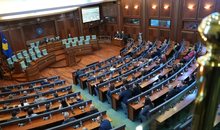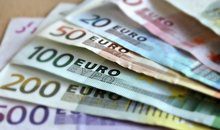
 Flash News
Flash News
Pyrotechnics near the Polytechnic University, police seize materials and launch investigations
Shots in Allias, the 31-year-old is shot by the neighbor, the perpetrator disappears after the incident
Posta e mëngjesit/ Me 2 rreshta: Çfarë pati rëndësi dje në Shqipëri
HIV on the rise in Kosovo, 10 new cases recorded in five months
AMP checks at Kapshtica customs, drug found hidden in a vehicle
DW: U.S. tariffs hamper Germany's economic recovery, production and exports decline

Despite the signs of hope, Germany still looks far from sustained economic growth. German industry has started the second quarter with a setback.
According to data from the Federal Statistical Office, industry, construction and energy suppliers reduced production in April by 1.4%, compared to the previous month, a sudden significant decline.
In April, German exports fell for the first time since October 2024. Statisticians estimated a decrease of 1.7% compared to the previous month, to 131.1 billion euros.
The frightening effects of the tariff war launched by US President Donald Trump are slowly beginning to manifest themselves in economic data. "Instead of a new beginning, there is disappointment," comments Volker Treier, Director of Foreign Trade at the German Chamber of Industry and Commerce (DIHK), regarding export data. "The drastic drop in exports to the US has a significant impact."
The same applies to industrial production: The Federal Ministry of Economy warns of possible obstacles due to the trade uncertainty stemming from US tariff policy. "As a consequence, the prospects for a recovery of industrial production have become a little more bleak recently," the ministry states.
Does it look like a turning point on the horizon?
However, experts also warn against excessive pessimism. Sebastian Dullien, scientific director of the Hans Böckler Foundation's Institute for Macroeconomics and Economic Research, believes that the decline in exports and production is not a cause for unnecessary concern: "Overall, the indicators suggest that the situation in the industry is stabilizing and that we may be approaching a turning point for the better."
Commerzbank also sees signs of a potential improvement. Analyst Ralph Solveen points to the increase in the number of orders and the increase in the ifo business climate index: "Therefore, we assume that the German economy will return to growth in the coming quarters, although higher US customs tariffs and structural problems in the German economy will prevent a strong recovery."
German Central Bank predicts delayed recovery
The German Central Bank (Bundesbank) also issued an opinion on the development of the German economy. According to him, Germany will slowly come out of the abyss, due to uncertainty over US trade policy. According to the German Federal Bank's semi-annual forecast, the economy will stagnate this year. In its December forecast, it still expected a slight increase of 0.2%.
"New US customs tariffs and uncertainty about future US policy will initially hamper economic growth," explained Joachim Nagel, president of the German Central Bank. In 2027, the massive government spending planned for infrastructure and defense will strongly boost the economy.
Fiscal packages can accelerate recovery
Other economists also believe that the government's multibillion-euro fiscal package could have positive effects. "The German economy is benefiting from the ECB's rate cuts and, soon, from the big fiscal package, although the increase in US tariffs is hampering the recovery," says Jörg Krämer, chief economist at Commerzbank.
According to IMK economist Dullien, a slow acceleration of growth is expected in the coming months, mainly thanks to the measures announced by the general government. "Starting from July, the improved conditions of depreciation of expenses should lead to an increase in demand for investments. Additionally, companies are likely to recoup investments deferred at that time. Public investments financed by the special infrastructure fund should boost growth."
Eurozone: Growth exceeds expectations
Positive economic signals came from the Eurozone. According to the data of the Eurostat Statistical Office, economic activity increased by 0.6% in the first quarter compared to the previous quarter. In the third assessment, the increase was significantly revised from 0.3% in the second assessment.
The data on economic growth in Germany have also been corrected. According to these figures, the German economy grew by 0.4% between January and March. Initially, an increase of only 0.2% was announced. As the strongest economy in the 20-nation Eurozone, the German economy is particularly important for the well-being of the monetary area.
However, it should be noted that the potential consequences of the tariff dispute with the US have not yet been felt during this period. Therefore, the relevance of the data for the eurozone and Germany is quite limited./DW
Latest news


Police take stock of May: 625 arrested and 415 thousand euros of assets seized
2025-06-08 16:15:37
Italy/ 16-year-old Albanian stabbed, investigations reveal first clues
2025-06-08 15:57:54



Citizenship referendum polarizes society in Italy
2025-06-08 14:38:51



Foreign tourist gets stranded on the beach, police intervene
2025-06-08 13:04:56


Five people are arrested in Kapshtica, four of them border policemen
2025-06-08 11:46:41
The Serbian team leaves Tirana under strong security measures
2025-06-08 11:20:25




Trump-Musk clash risks sinking NASA, biggest cuts in its history
2025-06-08 09:41:34




Temperature up to 38 degrees, weather for today
2025-06-08 08:21:33
Posta e mëngjesit/ Me 2 rreshta: Çfarë pati rëndësi dje në Shqipëri
2025-06-08 08:04:53
Albania-Serbia clash ends goalless, Manaj misses 'golden' chance
2025-06-07 22:42:40


Trump warns of 'consequences' if Musk funds political rivals
2025-06-07 21:29:11


14-year-old falls from 6th floor of apartment in Tirana
2025-06-07 20:28:07
"Old enemies don't make new friends"
2025-06-07 19:52:58




HIV on the rise in Kosovo, 10 new cases recorded in five months
2025-06-07 17:47:59
Fire in the waste field in Vlora, Berisha: Monstrous crime against citizens
2025-06-07 17:27:40

PL: The country's food safety system does not track food contamination
2025-06-07 16:40:37
Fire engulfs Vlora waste field again, mayor: Intentional
2025-06-07 16:20:06
20-year-old man ends his life in Pogradec, police reveal details
2025-06-07 15:47:29
Tourism without heritage: Durrës opens the season with museums closed
2025-06-07 15:27:30

Gjendet një person i pajetë në Tiranë
2025-06-07 14:54:23
Detailed control, the rules that fans must follow in the Albania-Serbia match
2025-06-07 14:32:19
A heat wave will sweep across Albania next week
2025-06-07 14:10:18





AMP checks at Kapshtica customs, drug found hidden in a vehicle
2025-06-07 12:15:26
Kosovo Assembly fails to be constituted even after 28 attempts
2025-06-07 11:58:58


Oh Albania, you have no old age!
2025-06-07 11:05:01


Mavraj's message to the Rossoneri: Kosovo is ours forever. Now play football
2025-06-07 10:10:52


Why are Ukrainians being accused of arson at Keir Starmer's properties?
2025-06-07 09:16:24
Foreign exchange, how much foreign currencies are sold and bought today
2025-06-07 09:04:55

Horoscope, what do the stars have in store for you today?
2025-06-07 08:31:29
Weather forecast for Saturday, here's what the temperatures will be like
2025-06-07 08:17:35
Posta e mëngjesit/ Me 2 rreshta: Çfarë pati rëndësi dje në Shqipëri
2025-06-07 08:01:23
Heavy metals in the Drin River, causes of cancerous diseases
2025-06-06 22:54:02


Works in Spaç, Lubonja: Destruction of collective and historical memory
2025-06-06 21:54:32

DASH: Balkans, part of American strategy for expelling migrants
2025-06-06 21:12:33

Ilir Shqina, a diplomat, and her business partner Grida Dumas were suddenly born
2025-06-06 20:21:46


Couple injured in Kavaja, police find firearm hidden in wall
2025-06-06 19:05:19

EULEX mandate in Kosovo extended until 2027
2025-06-06 17:58:20
These are the 3 zodiac signs that will be favored in the next decade
2025-06-06 17:50:52


Anthropology
2025-06-06 17:06:00
EU supports International Criminal Court after US sanctions
2025-06-06 16:47:51
Gonxhe ignores concerns about Spaçi and defends the continuation of the works
2025-06-06 16:31:42
Providing online services, report: Institutions, delays in update requests
2025-06-06 16:24:10

The head of the Vlora Cadastre is changed again
2025-06-06 15:58:49
With a rounded belly, Dafina Zeqiri enjoys the holidays with her partner
2025-06-06 15:36:06

Foods that should not be missing from the Eid al-Adha table
2025-06-06 15:04:48
They exploited girls for prostitution in Vlora, 28-year-old arrested
2025-06-06 14:44:26
Israel warns of more attacks in Lebanon
2025-06-06 14:26:30
The race for the head of the BKH, the deadline for applications ends today
2025-06-06 14:15:18
14-year-old girl in Vlora rescued after risking drowning at sea
2025-06-06 14:04:23
